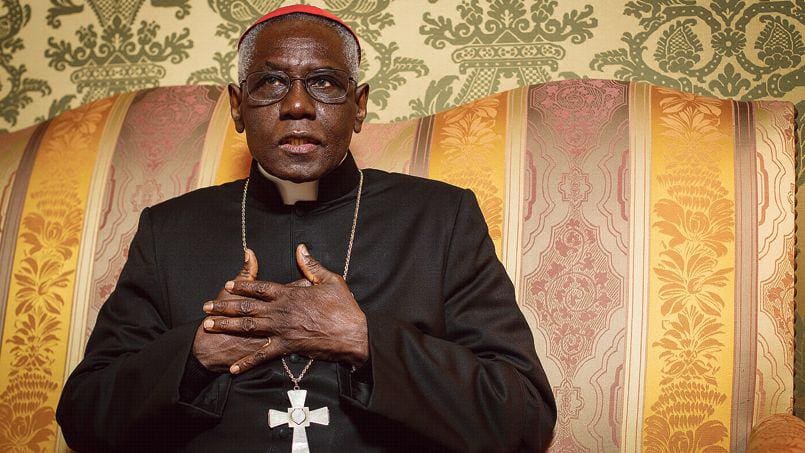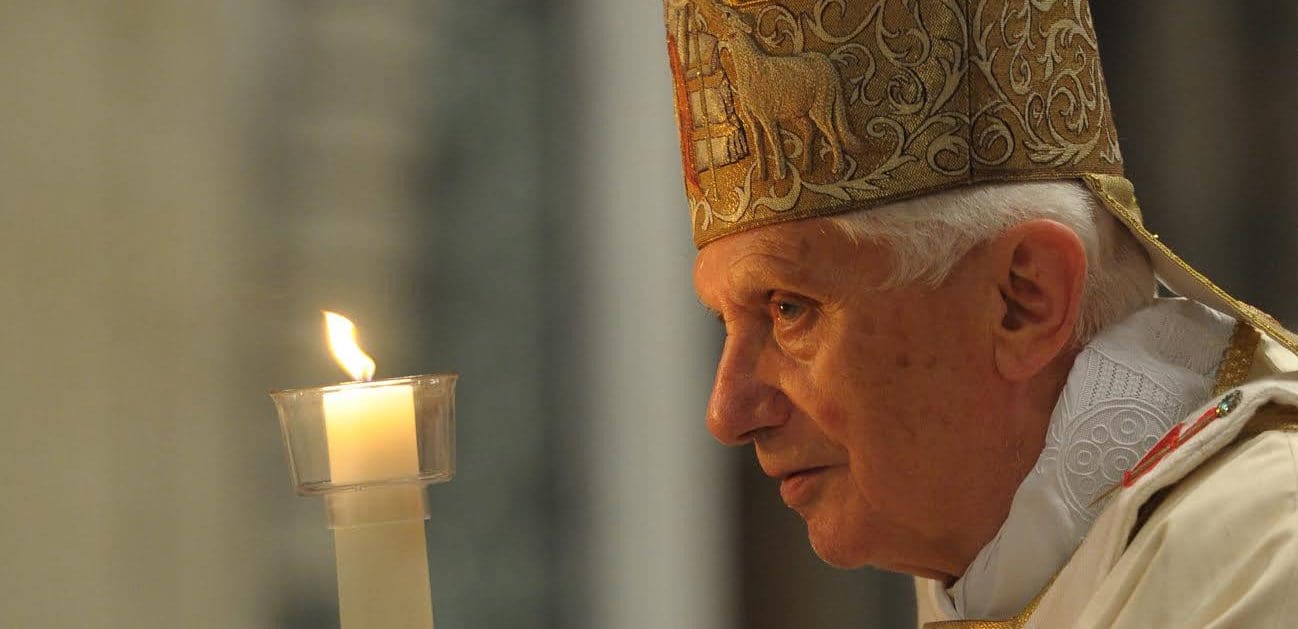Editor’s Note: During a November. 7 interview in Rome, Cardinal Robert Sarah, former prefect of the Congregation for Divine Worship and Discipline of the Sacraments, spoke about his latest book, Catechism of the Spiritual Life, published by EWTN Publishing in October 2022. The on-camera interview was conducted by EWTN Rome Bureau Chief, Andreas Thonhauser. Minor editing changes were made for clarity. Adoremus has also edited the interview for length.
Your Eminence, what made you decide to write a book on the spiritual life?
Amidst the confusion of this day, outside and even inside the Church, I saw a need for a representation of some reflections on our spiritual progress in our spiritual life: progress in our personal and intimate relationship with Jesus Christ. It is not a catechism to compete with the Catechism of the Catholic Church, but it is narrower in scope, I hope answering a profound need of our time. Every one of us must strive, continuously, to draw closer to Jesus Christ, to return to his word, and to the simplicity of the faith in his self-revelation. It is the simplicity of the desert, of recognition of our dependence upon God, and encountering him and the gift of his love and his grace, by which he configured us to himself. That is why I decided to write Catechism of the Spiritual Life.
And why would you say the spiritual life needs a catechism?
Well, God has been forgotten in modern society. We all live as if God doesn’t exist. Confusion reigns everywhere. Too many would reduce our lives, the very meaning of our lives, to absolute individualism and the pursuit of fleeting pleasure. In this situation, then, we require a retreat from the world, withdrawal into the desert, where we can relearn the fundamentals, the basics: monotheism, the revelation of Jesus Christ, us and God, his word, our sin, our dependence and need of his mercy. Through his Church and the sacraments, God guides us into an ever-deeper relationship with him. And we all have a need to reacquaint ourselves with his profound gift, which is his love. So we need a catechism because we need to approach [closer and closer] to God.
How does one enter, and how does one progress in, the spiritual life? And how does this path differ from a non-spiritual life?
We enter into spiritual life by following Christ. He turns us toward himself, by his grace. We are led by him. And like the Hebrews, he leads us into the desert. There is a characteristic of spiritual life: There is no illusion of self-sufficiency, no false sense of security. We are justified only by Christ; we depend on him. He is our rock, and the Word of God is our firm foundation. This is another characteristic of spiritual life. Worldly life is built on sand. Without God’s word, people can think that they live an upright life, but it is illusory. The principles and values of moral law meet and find their reconciliation only in Christ. Human reason requires God’s help. Without God, we cannot live any just life, any vital life. We need God.
You describe the sacraments as pillars of the spiritual life. Do you think we need to put more effort into explaining the sacraments as the pillars of spiritual life and bring them to the attention of our modern society?
Sure. The sacraments remain part of the life of the faithful. But their significance has been forgotten or obscured by worldly concerns. We need to rediscover this as the principal means of grace that Jesus established in his Church. We need to understand the sacraments. They are not social affairs. Baptism, for example, should not be delayed to wait for a family gathering. But parents must hasten to baptize the children because their baptism is really the gate to the spiritual life, the gate to enter into the Church. Each of the seven sacraments is a gift of the Church, to illuminate how God intervenes in our lives for the sake of our salvation. So we need to explain more deeply: What is baptism? What is confirmation? What is the Eucharist? Not only a meeting for families. So this is why I wrote this book: to deepen our knowledge of the sacraments.
But you also write about the loss of faith in the Real Presence of Christ in the Eucharist. Why do you see this loss of faith as a cause for a decline of Christian communities? And how could we revive this faith?
I know that without faith in the Real Presence of Christ in the Eucharist, the Church becomes only a horizontal phenomenon. The Church loses the meaning of her existence. The Church is not a social organization, to meet the problems of migration or poverty. The Church has a divine purpose: to save the world. If Christ does not dwell within the Church, tangibly, visibly, sacramentally, then what good news do we have to offer to the world? What is the meaning of evangelization? When Christians forget why they are Christian, the community must fall into decline. They forget the Gospel and lose sight of their purpose.
For those who still approach the Eucharist, if they lack faith in the Real Presence of Jesus Christ in the Eucharist, they will likely receive him, but unworthily, so without the result of progress in the Christian life. They, thereby, do violence to his Body, bringing condemnation upon themselves, and further hastening the community decline. To restore the Church, we need only to listen to the words of Jesus Christ: “This is my Body; this is my Blood.” Christ is not merely present in thought, subjectively. When you gather for the Holy Mass, he is present to us in the most supreme manner: In his Body, in his Blood, in his Soul, in his Divinity. In the Eucharist, he gives himself to us as food. He enters into our bodies, and he does not disappear in us, but we are taken up to him. We dwell in him, and he dwells in us. So beautiful is the Holy Mass, that if, only for a moment, we quiet ourselves and consider the immensity of the Eucharist, our faith in his presence must spring into life and lift our hearts to him.
Perhaps we can stay on this subject: the sacredness of the liturgy. Can you tell us more about its sacredness? What role does, for example, silent adoration in front of the Eucharist play? How do we lead people back to the mystery of adoration and to the appreciation of the adoration?
In the Eucharist, we encounter Jesus Christ, personally and intimately. Holy Mass is an essential part of Christian life. Christ himself tells us, “Do this in memory of me.” But having encountered him in the liturgy, how can we not desire to spend time with him in silent adoration? The minutes and the hours that we spend in his presence in the Eucharist continue his work in us by which he transforms us and conforms us to himself, makes us so that we become Christ, himself. The liturgy is sacred. It is our responsibility to confirm ourselves to eat, to be shaped by the liturgy, to reflect its holiness. The liturgy is sacred, it is holy, because it comes from God. It is not our invention, our creation.
And when we encounter Christ in the Eucharist, silently, we really change our lives. We really become his disciples; we really become Christian. This is quite clear from this reflection upon what we are doing in the liturgy: We commemorate the death and the resurrection of Our Lord by which he redeems us and draws us into his divine life. The liturgy leads us to his divine life. And I will encourage us to keep the liturgy more and more sacred, more and more holy, more and more silent, because God is silent, and we encounter God in silence, in adoration. I think that the formation of the people of God in the liturgy is very important. We can show people the beauty, to be reverent, and to keep silent in the liturgy, in which our encounter with Christ is deepened.
During my time as prefect of the sacred liturgy [congregation], I learned that liturgy must be a very great moment, a very unique moment, to encounter God face-to-face and to be transformed by him as a child of God and as a true worshipper of God. Liturgy must be beautiful, it must be sacred, and it must be silent.
I think that we must be more careful, when we are gathered for the Eucharist at Mass, not to transform the sacred Mass into a spectacle or a drama, or a phenomenon of gathering people together because they are friends, but, rather, to worship God. And when we worship God silently, then God will transform our lives. We become like God.
St. Irenaeus said, “God has made man that man becomes God.” And the liturgy contributes to make us God. It is very important to really progress in sacred liturgy: not to let people create their own liturgy and desecrate the liturgy, but to make it more powerful as the presence of God among men.
You also mentioned in your book that the ultimate weapon in the spiritual battle is penance. But we see that many refuse or ignore the gift of confession. What is your explanation for this?
Well, confession appears at the very beginning of the Gospel. Jesus said to us: “Repent, for the kingdom of God is at hand.” At the beginning, Christ commanded [all people] to confess, to repent. Repentance is the beginning of divine life, the restoration of our friendship with God. The sacrament of confession is a wonderful gift by which God, again and again, restores us in his grace. We ought to welcome in our hearts sorrow for our sins, which is the work of the Holy Spirit, and receive the liberty from sin that comes with repentance. We ought to make a habit of this, turning, again and again, day after day, to the Lord, escaping, quickly, the despair, the deception of this world.
Rather than embracing the gift of confession, too many have come to resent it. In doing this, they resent the truth: That is the truth, that they are a sinner in need of God’s mercy. Unfortunately, we have lost, in recent decades, the sense of sin. Many do not accept that man is a sinner. There is no sin today.
Perhaps some of the faithful resent confession because they cannot submit to the authority of priests. So many of those whose reputations are ruined by the atrocity of sexual abuse committed by a few priests. But these rebellions are mistaken because confession has nothing to do with a personal worthiness of the priest. The priest can be a sinner. But through the priest, it is Christ who forgives. So we do not have to look at the priest who is a sinner. Through the priest, it is Christ who forgives. We all require his forgiveness. And he would pass through the priests.
And no mistrust or resentment of the priest should stop us from going to confession. We know that St. Augustine said, when priests baptize, it is Christ who baptizes. When Judas baptized, it was Christ who baptized. If a sinner baptizes in the name of the Father, and of the Son, and of the Spirit, it is Christ who baptizes. So it doesn’t matter that the priest is insufficient. We have to go to him and recognize our sins, and God will forgive us.
By Andreas Thonhauser
Editor’s note: To read the full interview, go to the National Catholic Register.
Image Source: AB/Daniel Ibanez/CNA/EWTN


